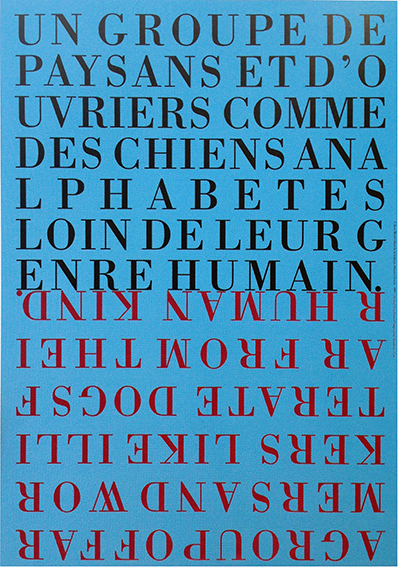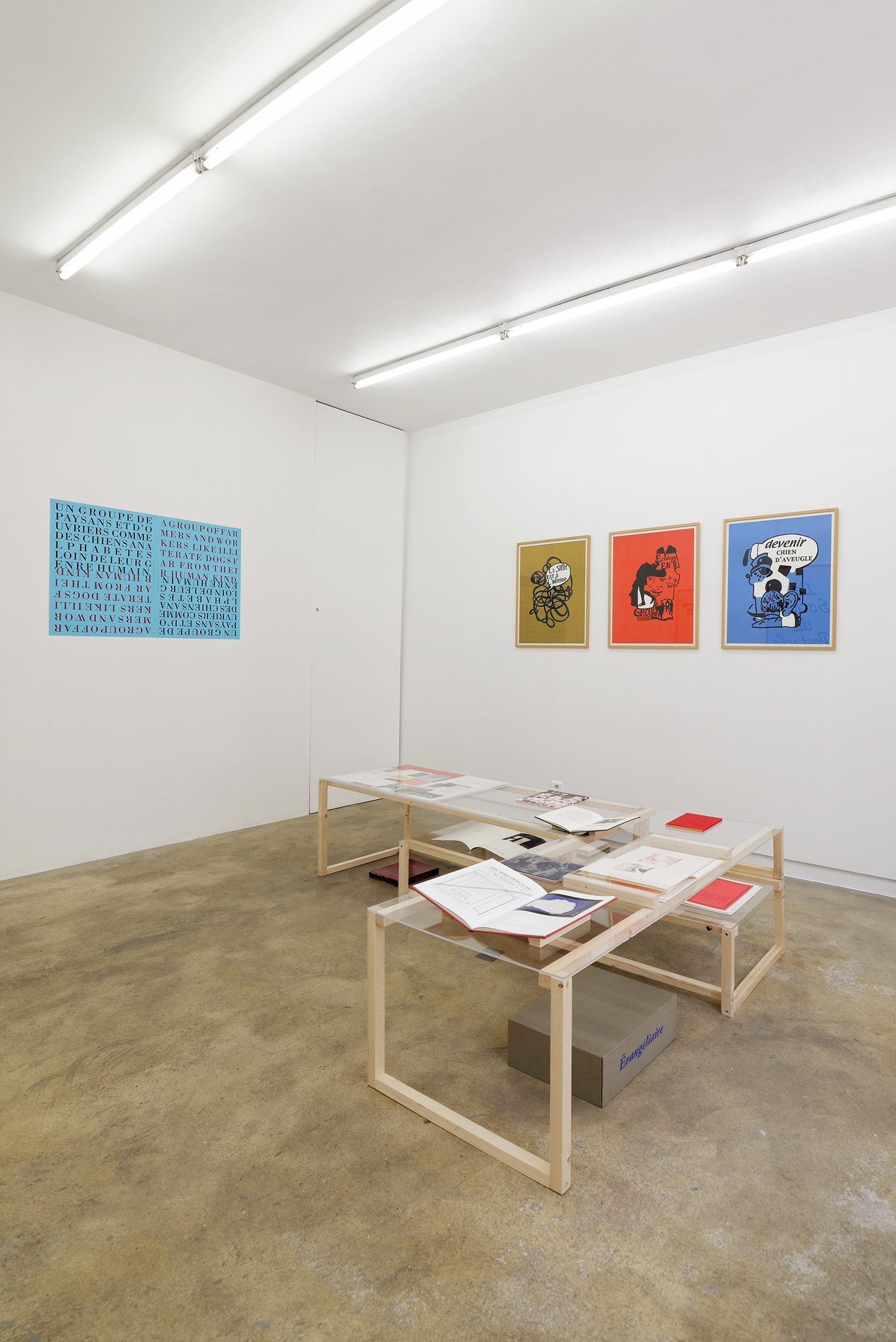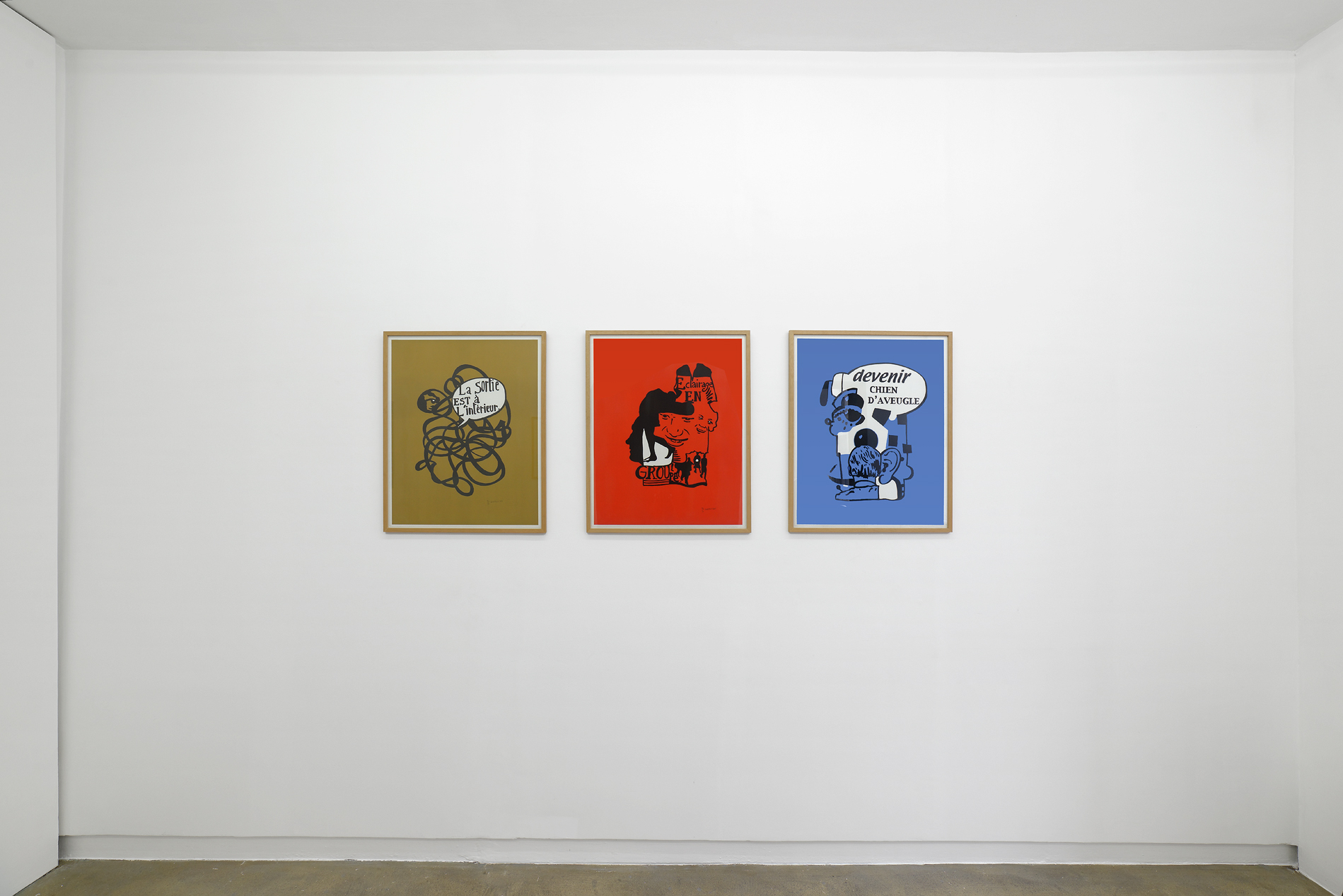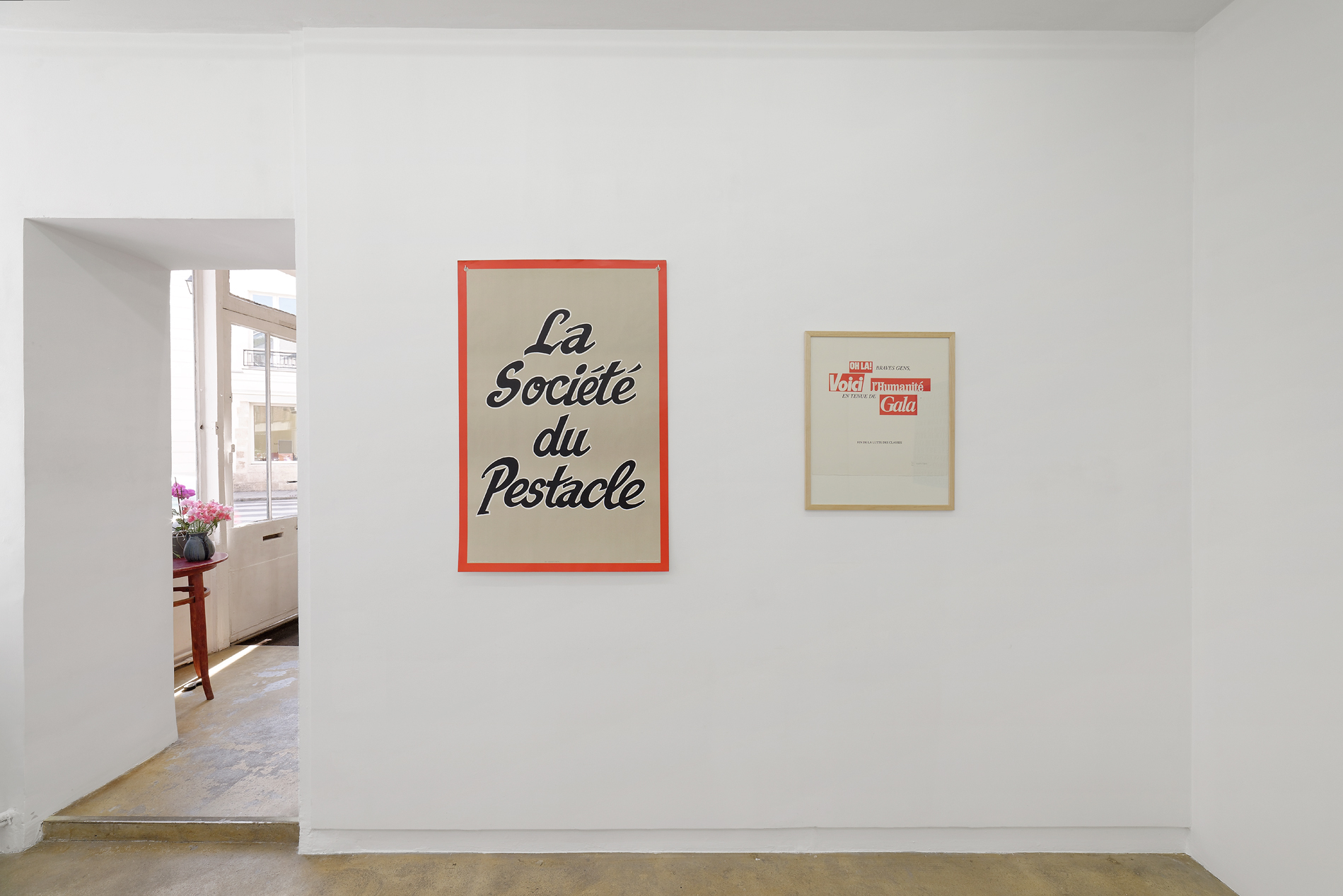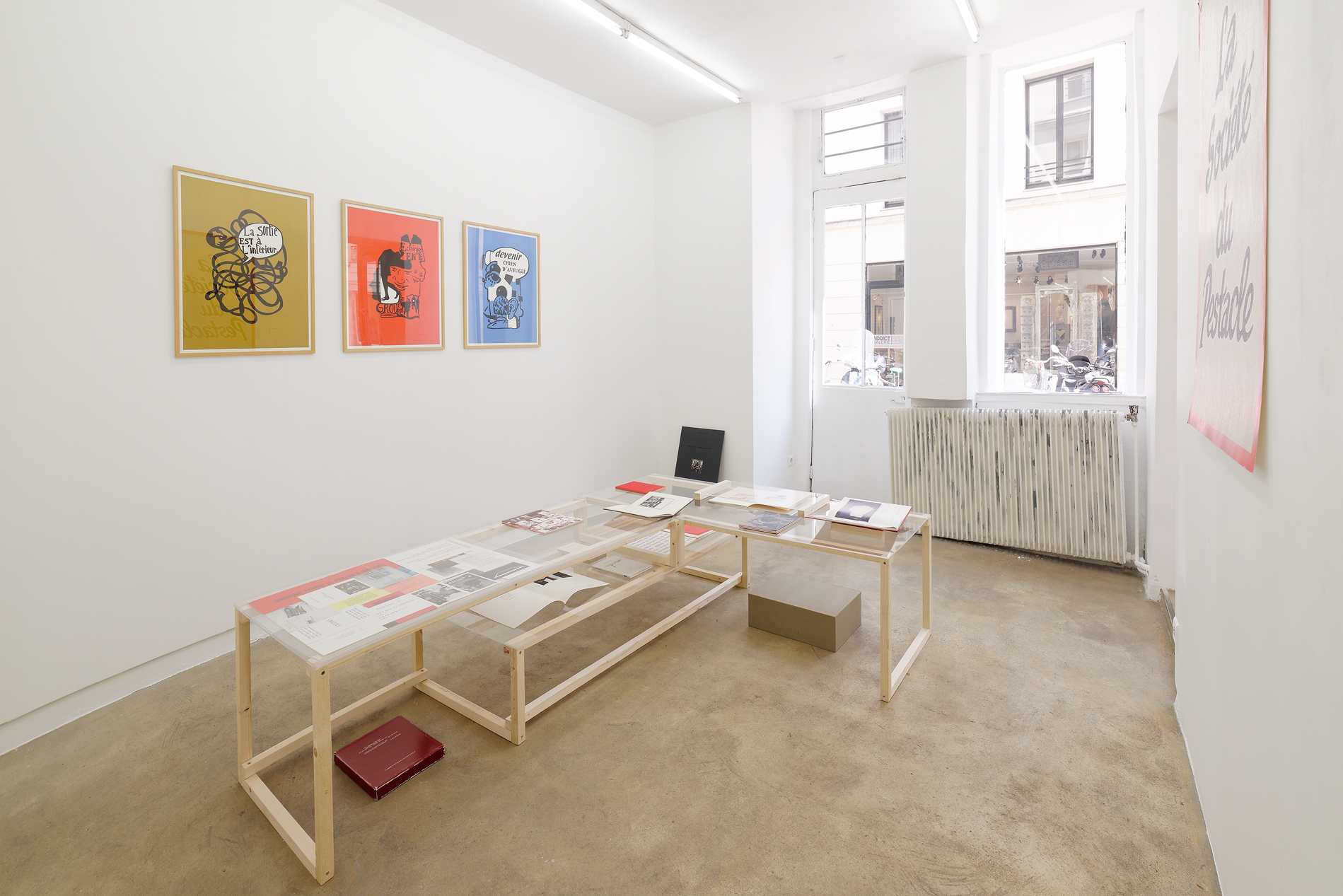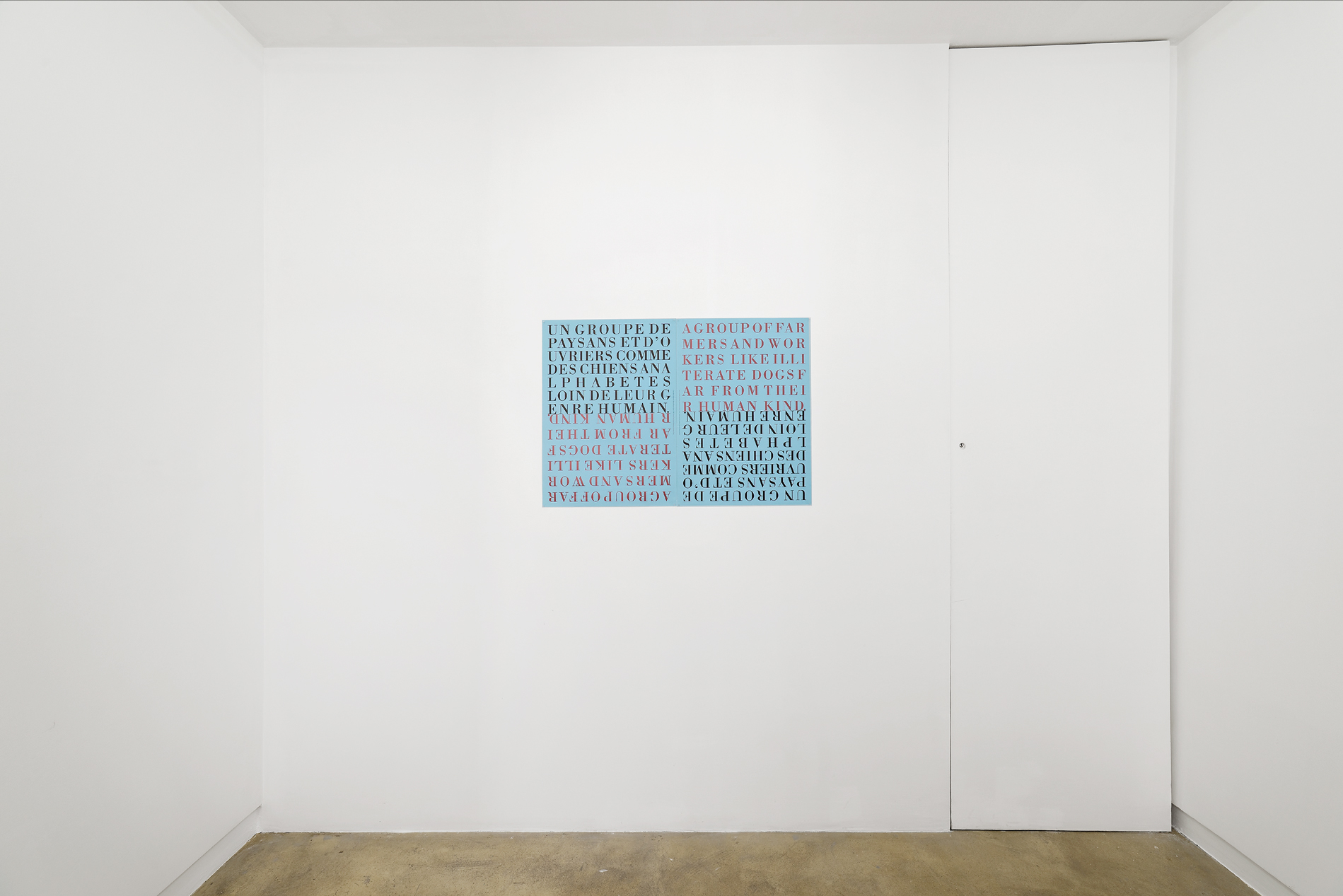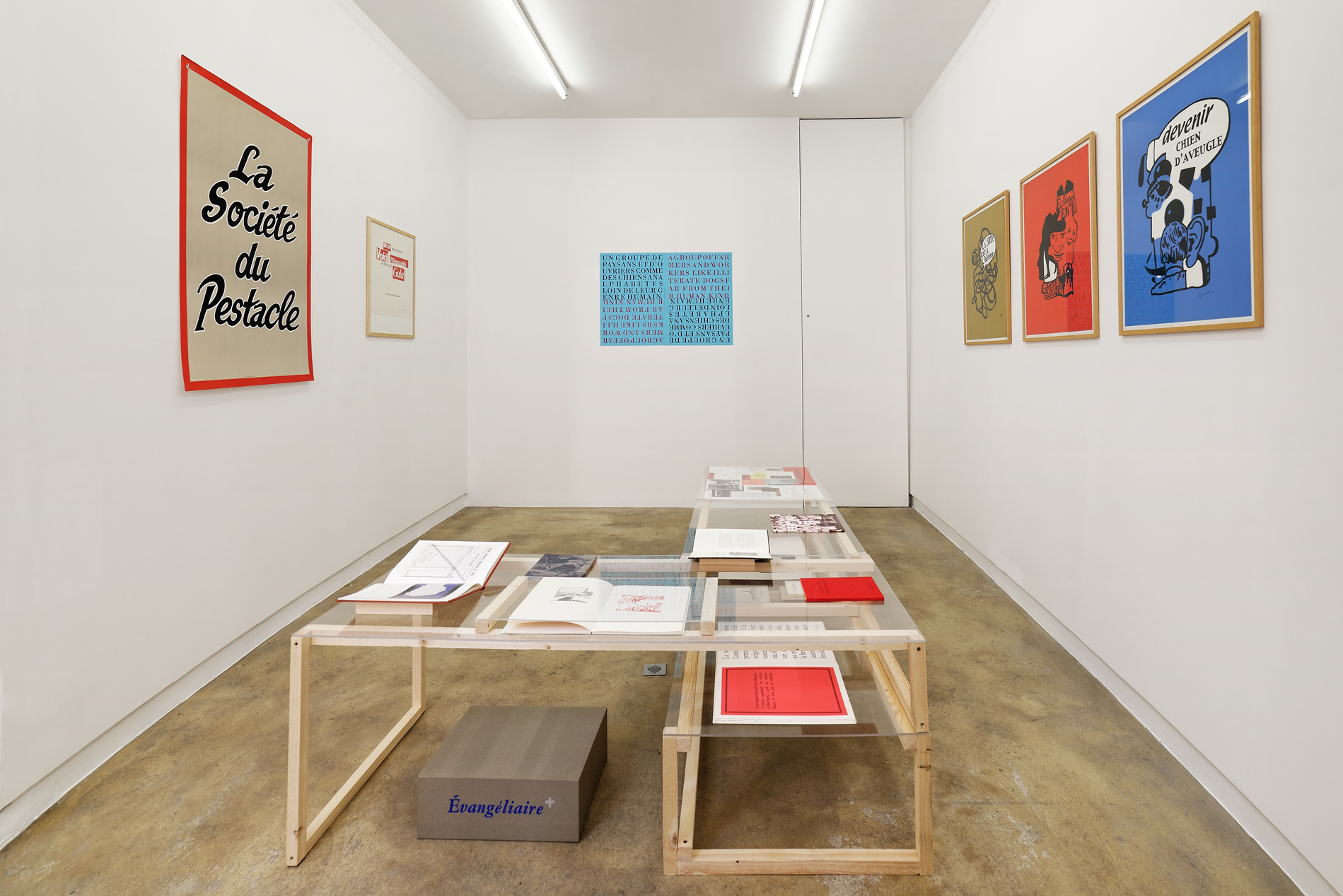En 1995, Florence Loewy conçoit pour Printed Matter, la librairie historique de New-York spécialisée dans le livre d’artiste, l’exposition Fiction ? Non –Fiction ? autour des livres de huit artistes français choisis « pour la constance avec laquelle ils se sont intéressés à ce support ». En guise de catalogue d’exposition, l’éditrice entreprend le catalogue raisonné des livres de ces artistes et invite chacun d’eux à intervenir sur la double page précédant la liste de ses publications. Jean-Michel Alberola imagine pour les deux pages qui introduisent la description bibliographique des vingt-neuf livres qu’il a créés à cette date, deux images faites des mots : « Un groupe de paysans et d’ouvriers comme des chiens analphabètes loin de leur genre humain ». Page de gauche, le texte en français, en lettres manuscrites, en noir et en rouge, se superposant au tracé en rouge d’une tête d’âne ; page de droite, le texte en anglais, en typographie en noir, encadré d’un filet rouge. Florence Loewy édite la même année, tirée en offset à 500 exemplaires, une variation sur cette formule, un placard typographié en noir (VF) et en rouge (version anglaise) sur fond bleu.
Sous tendue par l’idée de transmission, de partage et de démocratisation du marché de l’art, la production de ses estampes, affiches et livres d’artiste constitue pour Jean-Michel Alberola un espace de création essentiel. La dimension politique de cette œuvre qui questionne, avec ironie et malice, le fait d’être peintre aujourd’hui et le rôle de l’artiste dans la société, y est particulièrement perceptible. Complice de longue date et guide facétieux dans l’arpentage des territoires d’Alberola, Bernard Marcadé notait dans la Table des matières du catalogue de l’exposition Les évènements, les situations et les sentiments : « Chapitre XXXII Où il est fait explicitement référence à la formule de Jean-Michel Alberola : Un groupe de paysans et d’ouvriers comme des chiens analphabètes loin de leur genre humain, où l’on comprend qu’elle constitue un fondement de sa peinture, où il est fait état, par la même occasion, des frères Le Nain et des frères Lénine, où Jean-Michel Alberola continue la réflexion de Paul Klee amplifiée par Gilles Deleuze : dans l’oeuvre d’art, il y a le peuple qui manque. »
Textes, citations laconiques, aphorismes, slogans (fragmentés, détournés) sont omniprésents dans l’oeuvre multiple d’Alberola. Suivant parfois le principe « qu’une parole dite est l’équivalent d’un tableau fait », les mots font l’image. Ailleurs, introduits par différents dispositifs, collages, bande dessinée ou schémas scientifiques, les éléments textuels viennent pirater insidieusement la représentation. Ainsi du récit en 65 images de La Vie de Debord, extraordinaire montage de citations de La vie de Rancé de Chateaubriand insérées dans des bulles qui s’échappent, comme des bribes de conversation, de vues de maisonnettes isolées, livre que Florence Loewy présente aujourd’hui dans sa galerie dans un hommage joyeux à ces liens de plus de vingt ans qui unissent, dans la défense du genre du livre d’artiste, la libraire et éditrice à l’artiste Jean-Michel Alberola.
In 1995, Florence Loewy curated the exhibition Fiction? Non –Fiction? for Printed Matter, the historical New York bookstore specialized in artist books. The exhibition focused on the books of eight French artists, chosen “for the consistency with which they had shown an interest in this medium.” Instead of a simple exhibition catalogue, the publisher undertook the realization of a catalogue raisonné of all the books published by these artists, and gave them each free rein to fill the double-page preceding their list of publications. In the two pages introducing the bibliographic description of the twenty-nine books he had created to date, Jean-Michel Alberola thought-up two images made of words: “A group of farmers and workers like illiterate dogs far from their mankind.” On the left-hand page, the text featured in French in handwritten black and red letters, superimposed onto the red outline of a donkey’s head; on the right-hand page, the English version of the text featured in black typography with a thin red contour. That same year, Florence Loewy published a graphic variation of this phrase: a poster with black (French version) and red (English version) typography on a blue background. The poster was offset printed in 500 copies.
Underpinned by the idea of transmission, of sharing and democratizing the art market, Jean-Michel Alberola considers his production of his prints, posters and artist books as essential creation spaces. In this oeuvre that questions the act of painting and the role of the artist in contemporary society with irony and mischief, a political dimension is particularly discernible. Bernard Marcadé— an old accomplice of Alberola’s and a facetious guide into his artistic territories—wrote in the Table of contents of the catalogue for the exhibition Les évènements, les situations et les sentiments [Events, situations and feelings]: “Chapter XXXII where on can find an explicit reference to Jean-Michel Alberola’s phrase: A group of farmers and workers like illiterates dogs far from their mankind, where one can understand that it constitutes a founding statement of his work as a painter, where mention is also made of the Le Nain brothers and the Lénine brothers, where Jean-Michel Alberola continues Paul Klee’s reflection, amplified by Gilles Deleuze: in the work of art, the people is missing.”
In Alberola’s multiples there is a ubiquitous presence of texts, laconic quotations, aphorisms and slogans (that can be fragmented or twisted). At times, words make up the image, thereby following the principle: “saying something is the equivalent of making a painting.” At others, the representation is insidiously hijacked by textual elements through a variety of devices such as collages, comic strips or scientific diagrams. Thus is the story in 65 images of La Vie de Debord [The Life of Debord]: an extraordinary montage of quotes from Chateaubriand’s La vie de Rancé, inserted into speech bubbles escaping from little isolated houses, like snippets of conversations. This book is currently shown at Florence Loewy’s gallery, as a joyful tribute to the twenty years that the publisher/bookseller and the artist Jean-Michel Alberola have spent united in defending the artist book as a genre.
